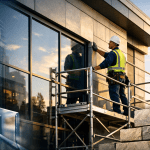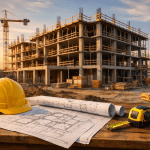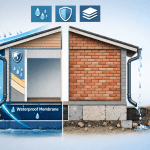
Renovate —it’s a word full of potential, especially for landlords or long-term tenants looking to improve the comfort, functionality, and value of a rental property in the UAE. But hold on—before you start knocking down walls or upgrading fixtures, it’s crucial to understand the legal framework that governs rental property modifications in the UAE.
Whether you’re a tenant wanting to personalize your space or a landlord aiming to boost rental value, this blog breaks down how to renovate a rental property without violating UAE laws.
Understand Your Rights and Responsibilities
In the UAE, especially in cities like Dubai and Abu Dhabi, the landlord-tenant relationship is governed by laws that balance the rights of both parties. The main point to understand is that tenants are not allowed to renovate or make alterations to the rented property without written permission from the landlord.
Under Dubai’s Law No. (26) of 2007 and its amendment (Law No. (33) of 2008), any substantial changes to the structure, design, or systems (like plumbing and electrical) must be pre-approved. Violating this can result in legal action, financial penalties, or eviction.
Step-by-Step Guide to Legal Renovation
Here’s a straightforward guide on how to renovate your rental property legally in the UAE:
- Get Written Approval
Always begin by informing your landlord of your renovation plans. Include a written proposal outlining the nature of the work, materials, costs, and contractor details. Verbal consent is not sufficient—get it in writing and ideally notarized.
- Consult the Tenancy Contract
Before initiating any changes, read the tenancy contract thoroughly. Many contracts explicitly prohibit certain types of renovation, especially those involving structural modifications. Some contracts may also require the tenant to restore the property to its original condition at the end of the lease.
- Check With Relevant Authorities
Depending on the scope of your renovation, you might need to seek approvals from the Dubai Municipality, Abu Dhabi Department of Municipalities and Transport, or other local governing bodies. For example, knocking down internal walls or adding plumbing requires municipal clearance.
- Use Licensed Contractors
If your renovation includes plumbing, electrical, or structural work, ensure you hire licensed professionals registered with the relevant authorities. Using unlicensed labor can result in fines and rejected permits.
- Respect Building Codes and Community Rules
Especially in apartment complexes, you must adhere to community rules regarding noise levels, working hours, and waste disposal. Building management can stop renovation work that violates these guidelines, even if your landlord has approved it.
What Kind of Renovations Are Typically Allowed?
While the law is strict about structural changes, cosmetic upgrades are usually acceptable with landlord consent. Examples include:
- Repainting walls with approved colors
- Installing removable shelving or cabinetry
- Upgrading light fixtures
- Changing window treatments
- Adding rugs or temporary flooring solutions
These low-impact changes allow you to renovate without causing permanent alterations to the property.
Renovation Tips for Landlords
If you’re a landlord considering property upgrades to improve rental yield, here are some safe bets:
- Kitchen and bathroom upgrades: These are high ROI renovations that tenants love.
- Smart home features: Adding digital locks or smart thermostats can make your property stand out.
- Energy efficiency: Installing LED lighting, better insulation, or solar water heaters can save costs and attract eco-conscious renters.
Just like tenants, landlords must also obtain the necessary approvals and ensure that renovations comply with municipal regulations.
Avoid These Common Mistakes
- Renovating without a permit
- Assuming verbal consent is enough
- Hiring unlicensed workers
- Ignoring community regulations
- Failing to revert the unit to original condition upon lease termination (if required)
Each of these can turn a well-intentioned renovate project into a legal headache.
Conclusion
To renovate a rental property in the UAE successfully, you need more than just design ideas—you need a clear understanding of the legal boundaries. Always seek written permissions, follow building codes, and coordinate with your landlord and local authorities.
Renovations can add value and comfort, but only when executed within the law. With a bit of planning and compliance, your renovation journey can be both smooth and rewarding.
Ready to Build with Confidence?
Get in touch with Charminar to learn how our project management expertise can streamline your next development.
📧 contact@bluediamondfm.com
📞 +971 56 705 4223
🌐 https://charminardubai.com/







